- Home
- Steven Ehrman
The Mad Judge (A Sherlock Holmes Uncovered Tale Book 3)
The Mad Judge (A Sherlock Holmes Uncovered Tale Book 3) Read online
The Mad Judge
A Sherlock Holmes Uncovered Tale
Steven Ehrman
Copyright © 2013 Steven Ehrman
All rights reserved.
ISBN:1492721603
ISBN-13:978-1492721604
DEDICATION
To Michael, because Matthew gets everything else first.
DEDICATION
WORKS BY THE SAME AUTHOR
CHAPTER ONE
CHAPTER TWO
CHAPTER THREE
CHAPTER FOUR
CHAPTER FIVE
CHAPTER SIX
CHAPTER SEVEN
CHAPTER EIGHT
CHAPTER NINE
CHAPTER TEN
CHAPTER ELEVEN
CHAPTER TWELVE
CHAPTER THIRTEEN
CHAPTER FOURTEEN
CHAPTER FIFTEEN
CHAPTER SIXTEEN
CHAPTER SEVENTEEN
CHAPTER EIGHTEEN
CHAPTER NINETEEN
CHAPTER TWENTY
CHAPTER TWENTY-ONE
CHAPTER TWENTY-TWO
SPECIAL NOTE
WORKS BY THE SAME AUTHOR
The Sherlock Holmes Uncovered Tales
The Eccentric Painter
The Iron Dog
The Mad Judge
The Spider Web
The Lambs Lane Affair
The Frank Randall Mysteries
The Referral Game
The Visible Suspect
The Zombie Civilization Saga
Zombie Civilization: Genesis
Zombie Civilization: Exodus
CHAPTER ONE
The struggle to convince my friend Sherlock Holmes to go on holiday can scarcely be conveyed adequately unless one has undertaken the task. As friend and physician, I had watched Holmes solve a succession of difficult cases throughout the winter. He had gone days at a time without sleep, and had found himself more than once exposed to bodily harm. The great detective should have been covered in glory by the combined gratitude of several peers and the prince of a country that must go unnamed for the present. The upshot was that Holmes needed a rest away from our rooms on Baker Street. Our humble lodgings had become overrun with those who desired the aid of him and finally, through weary argument, I convinced my friend to come away with me to the country for some much needed rest.
An old army acquaintance from my days in Afghanistan, Captain John Withers, had written me, asking that I visit him. He was on convalescence from his regiment, due to a relapse of malaria from previous service in India, and was presently staying at the manor house of his father. The father was a retired financier who had left the great city of London for the cold comforts of a country squire in the North of England. As the winter was drawing to a close, I imagined the burst of spring in this region and determined to convince Holmes to accompany me. I had written Withers to make certain that the invitation to myself included my friend, and upon confirmation of that fact I embarked upon my difficult task in convincing Holmes to make the journey.
Hercules faced no greater labor than did I in the waning days of that winter. The great detective invented a myriad of excuses as to why he could not undertake such a journey, but I was resolute in my determination, and finally prevailed in my quest. With little packing, as both Holmes and myself were Spartan travelers, we soon arrived by train at our destination.
The Withers estate was a scant two miles from the small village of West Grantham, and we found a carriage awaiting us with a smiling John Withers at its side. He greeted us, and as soon as our luggage was stowed on board, we faced the final leg of our journey. After introductions, we began our short ride. The conversation was pleasant, John Withers had always been a congenial fellow, and Holmes himself seemed to begin to appreciate the opportunity to escape the bustle of the city, and to acclimate himself to the idea of a restful holiday.
The family estate was a typical English country home. It was large and cheery with a fireplace in every room. The master of the house, a widower of many years, was an affable old gentleman who fancied himself a squire and his good nature was infectious. All from the son to the large staff beamed good fellowship, and I found my hope for a pleasant stay in ascension.
Holmes, however, could not bring himself to relax entirely and his skills at deduction found a home in seemingly random observations that invariably were proven correct. After informing our host that it was evident that he had spent part of his youth in Ireland by his pronunciation of his diphthongs, I felt it incumbent upon myself to issue a gentle admonishment. Holmes consented to accompany me to the large library in the home and we soon found ourselves alone.
“Holmes, you really are the limit,” said I. “Is it possible that you simply cannot restrain yourself from intruding in the antecedents of our host?”
Holmes allowed himself a small laugh and placed a gentle hand upon my arm.
“Watson, you have allowed our long association to blind you as to what is expected of me,” said he. “If, in fact, I am not expected to actually sing for my supper, it is certainly expected by our host that I demonstrate some small modicum of my powers.”
“You are mistaken,” I protested. “Neither John, nor his father, expressed any such interest in my conversations. These good people have welcomed us to their home as a measure of their gracious nature.”
“That I do not doubt, old friend, but the desire to experience some small allotment of what they have read in your published tales lies beneath the surface.”
“So these deductive expositions of yours are merely a manifestation of my writings?”
I knew that Holmes felt that my stories of his cases were prone to drama at the expense of the science of detection. I had attempted, with little success, to convince him that the drama that I included was a part of all his cases, yet he still yearned, or claimed to yearn, for a dry exposition of his powers of deduction. As the only consulting detective in existence he doubtless thought it only his due, and the trappings of fame that came with the title were extraneous appendages.
“I simply state an obvious fact, doctor,” said Holmes blandly. “Is it not the case that without our association and your literary talents, such as they are, the name of Sherlock Holmes would only be known to Scotland Yard?”
“Holmes, you do yourself an injustice. Even without my small contribution your name would not have labored in the obscurity you claim. Why, at least three crowns of Europe might have toppled without your aid and those cases have never been chronicled. No, my friend you have brought your acclaim onto yourself with little help from your humble chronicler.”
“As you like it,” said he. “But, regardless of cause, believe me when I say our host expects to see a sample of my wares. My slight deduction of his youth thrilled him beyond measure, as you yourself must have observed.”
It was true that Squire Withers had quite enjoyed his experience of being under the microscope of Sherlock Holmes. He had beamed and laughed uproariously when Holmes had dissected his linguistic ancestry. I am certain that the retired man of finance was quite confident that he had buried all traces of his rustic youth in the Gaelic hinterlands. It occurred to me that certain secrets were best left hidden, but to Holmes his skills were science for the sake of science, and I believe he thought little of the potential consequences of his actions. Indeed to him they were merely academic exercises, but to others I sometimes wondered. At any rate I despaired of chastising my friend further and with a clap upon his shoulder we rejoined our hosts in the study of the home.
The senior Withers was a stout man with a florid face. The veins upon his nose betraye
d the tendency towards drink, and indeed he had a glass of brandy in his hand as we entered. John was at his father’s side. He had changed little from our army days together. I had noticed no symptoms of his recurrent bout with malaria, but I had observed him wracked with fever and shivers in our service together more than once over the years. He was a somewhat underweight fellow with a receding hairline, but with a bright cheerful countenance, which betrayed his still youthful years.
“Ah, Mr. Holmes and doctor,” cried our florid host as we entered. “I trust you are finding our country life to your liking. It must seem a bit sedate compared to London.”
“But, Mr. Withers, did you not make your fortune in that city?” asked Holmes.
“Indeed I did, my boy, but that was a lifetime ago,” mused the elderly man. “I worked like a madman in those days. I did it all for poor Helen. She deserved the life of refinement that only money can purchase. All of my effort and now she is long gone. Money cannot buy the ability to stay the hands of time gentlemen.”
The old boy was growing misty and his handkerchief stole to his eyes. I respectfully averted my gaze as he grew wistful. In an effort to change the subject to lighter fare John Withers cleared his throat and spoke.
“I say, Watson, I know full well that you have come here for a rest, and I hope you have found your stay here a pleasant one to date, but I fear outside agencies are plotting against your tranquil plans.”
“What the devil does that mean?” I countered, in a lighthearted manner. “Is it possible we are to be stoned by the villagers as outsiders?”
“Nothing so melodramatic as that, Watson,” he essayed. “But facts are as they are and well, here we are.”
“I am intrigued, but I am afraid I am thoroughly at sea. Would you mind being, perhaps just a bit more clear?”
“It is simply this, Watson. There is no denying that the presence of Mr. Homes has caused a stir in our sleepy county. I have heretofore shielded you from the prying gaze of our well intentioned friends and neighbors, but I fear the respite from the public you have enjoyed will soon come to an end.”
“Has our visit caused ill feelings towards your family, Captain?” asked Holmes, with no small concern.
“Of course not, Mr. Holmes,” replied John Withers. “But these are coming at an alarming rate.”
John brought forth a dozen sheets of paper from his jacket and waved them in the air.
“These are requests for introduction to you, sir,” he continued gesturing towards Holmes. “I have put off these requests until now, but I fear we will have to assent to some of them. I am sorry. I had no idea the news of your presence would spread so quickly.”
I watched Holmes as he processed this information. Although the detective decried my efforts in publicizing his cases I had little doubt that he enjoyed at least some aspects of his modicum of fame. I thought I could detect the struggle between his ego and his desire for solitude play out across his face. As Withers finished his speech Holmes leaned back in his chair and interlaced his fingers across his chest.
“My dear, Captain Withers,” said he. “I am not a social creature as my friend, Watson here can inform you, but neither am I an ungrateful guest. If the protocol is to present your neighbors with an opportunity to call I can scarcely refuse after your most commodious treatment of Watson and myself.”
Withers broke into a broad smile and his father gave a satisfied nod of his head. The senior Withers came to his feet and warmly shook Holmes’s hand.
“I cannot tell you how your words have warmed my heart,” said he. “Like my son, I have also received requests for an audience with you. The wife of Judge Upton sent me a message this very morning requesting to be received by you. Her letter was quite insistent and I hardly knew how to answer her.”
“I beg you to put your worries aside,” said Holmes. “I feel quite rejuvenated by my stay in your charming countryside and I do not believe that any of your friends or neighbors are capable of reversing that feeling. Pray let them come as they may.”
As if in answer to the words of Sherlock Holmes the butler walked noiselessly into the study and announced. “Mrs. Honoria Upton, sir.”
CHAPTER TWO
The announcement was followed immediately by the entrance of a lovely, raven-haired woman of middle age, entering the room. Everyone, myself included, rose at the entrance of the lady. Mrs. Upton carried herself with dignity, yet it appeared that a violent emotion was concealed just beneath the surface.
She passed by Holmes and myself, and threw herself into Mr. Withers arms.
“Oh, George,” she cried. “I am sorry that I did not wait for your reply, but I felt certain you would not deny me in my need.”
“Oh course, dear lady,” he said, with some embarrassment. The elderly widower attempted to extricate himself from the lady’s embrace, and succeeded in settling her in a chair. “You know full well I am at your service.”
“Thank you, George. You were ever a good man. I am at a loss at how to proceed and when I heard that Mr. Holmes was your guest it seemed to be a heaven sent answer to my prayers.”
I stole a glance at Holmes. The fact that the lady had come to consult him was no surprise to me, and evidently no surprise to him either, as he evidenced complete serenity at her pronouncement.
“I am Sherlock Holmes,” said he. “And allow me to introduce, my friend and companion Dr. Watson. In what way may I be of service to you?”
The lady turned to face Holmes and gave him a frank appraisal. I saw a shrewd gaze peeking out from puffy eyes that had undoubtedly been weeping.
“I am Honoria Upton, Mr. Holmes, but of course I was just announced wasn’t I?” she halted in some confusion for a moment, but managed to quickly gain control of her emotions. “I have been married to Judge Simon Upton for some fifteen years. I am his second wife, as the first Mrs. Upton died tragically quite young. We live on the estate that is adjacent to this one. It is only a scant two miles distant.”
As she finished she trailed off and seemed to lose her train of thought.
“Has something happened to your husband that has upset your household in some way, madam?” asked Holmes. His arrow appeared to hit the target as Mrs. Upton nodded eagerly in agreement.
“That’s just it, Mr. Holmes,” she said. “Perhaps I should begin at the beginning.”
“That is generally the best way forward,” said Holmes.
“Father, perhaps you and I should leave these good people alone,” said John. “This would appear to be a matter of some delicacy and privacy.”
“Quite right, my boy,” returned his father, and they both began to rise from their seats.
“I would not dream of exiling you from your own study, gentlemen,” said Mrs. Upton. “You may be of aid as well. George, you are one of Simon’s oldest and dearest friends. And John, you and Cyril have been chums since your days at university. This is a private matter now, but I fear it will not be for long if Simon’s behavior continues. Please stay by my side.”
“As you wish, Honoria,” said the elder Withers. “Any succor we can provide is yours for the asking.”
“For that I am grateful. Now, Mr. Holmes I suppose I should tell you that my husband and I have been happily married for some fifteen years. My husband was a widower when we met, and had already been appointed by the crown as a judge, but perhaps you remember him?”
“The name is familiar to me, madam,” said Holmes. “Watson, surely you recall Judge Upton. He adjudicated the small matter you described as The Case of the Missing Bishop.”
“Of course, Holmes,” I said. The trial had been a mere formality in the case, but Holmes was correct of course. The case in question had been a thorny one indeed. I recalled the judge as a stern figure with bushy eyebrows and a determined chin. He had cut a gaunt figure on the bench, and with his reputation for harsh sentences, made a formidable appearance in the courtroom.
“He has since retired, of course,” said the lady. “We settled here in
the country and there seemed to be no obstacle to our happiness, and for years we have been happy, but since the Christmas holidays a pall has been cast on our lives.”
The lady halted for a moment and we waited in silence. George Withers took the opportunity to light a pipe. He seemed tranquil, yet attentive to the lady’s story. If he had any hint of what was concerning her he gave no clue.
John had thrust his hands in his pockets and looked quite worried. If he and the lady’s stepson were as close as she had intimated, than it was possible he had a gleaming of the troubles in the Upton household.
Holmes, as always, gave the impression of careless attention. This was an affectation I had observed many times. The mind of my friend was as keen as the edge of a freshly honed blade, and I knew his casual attitude hid his alert scrutiny of the unfolding story. At length Honoria Upton continued.
“Simon’s long experience on the bench has, I believe, caused his mind to see conspiracies where none exist. When he and I lived alone on the estate these imagined conspiracies were of little concern. He imagined the staff was stealing and that the live stock was being poisoned every time a calf died. I thought, at first, that these were simple diversions to keep his mind busy in his retirement years, but there has been a change of late.”
“And what is it that has changed, madam?” asked Holmes.
“I can tell you what has happened,” broke in George, with a laugh. “You’ve allowed your home to become a boarding house. My word, Honoria, but you’ve taken in every stray kitten that has scratched at the door.”
“Hardly that, George Withers,” she said, in reprimand. She turned her attention back to Holmes. “It is true that our home has become quite full this past winter, but they are all family and dear friends. Simon was quite glad to see all of them, yet their presence has fueled more of his delusions.”

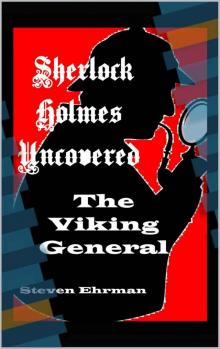 The Viking General (A Sherlock Holmes Uncovered Tale Book 9)
The Viking General (A Sherlock Holmes Uncovered Tale Book 9)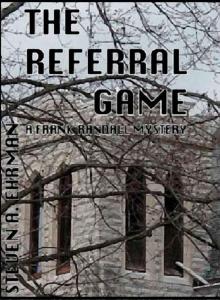 The Referral Game (A Frank Randall Mystery)
The Referral Game (A Frank Randall Mystery) Collection of Four Short Stories
Collection of Four Short Stories The Iron Dog (A Sherlock Holmes Uncovered Tale)
The Iron Dog (A Sherlock Holmes Uncovered Tale) The Eccentric Painter (A Sherlock Holmes Uncovered Tale)
The Eccentric Painter (A Sherlock Holmes Uncovered Tale) The Mad Judge (A Sherlock Holmes Uncovered Tale Book 3)
The Mad Judge (A Sherlock Holmes Uncovered Tale Book 3)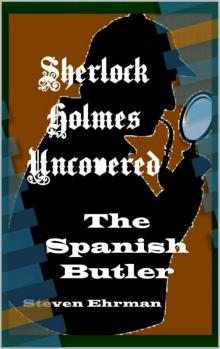 The Spanish Butler (A Sherlock Holmes Uncovered Tale Book 8)
The Spanish Butler (A Sherlock Holmes Uncovered Tale Book 8)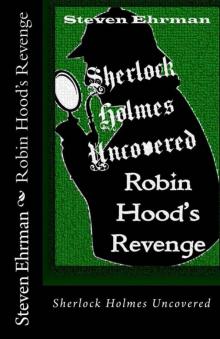 Robin Hood's Revenge (A Sherlock Holmes Uncovered Tale Book 7)
Robin Hood's Revenge (A Sherlock Holmes Uncovered Tale Book 7) Zombie Civilization: Exodus (Zombie Civilization Saga Book 2)
Zombie Civilization: Exodus (Zombie Civilization Saga Book 2)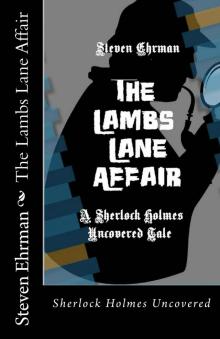 The Lambs Lane Affair (A Sherlock Holmes Uncovered Tale Book 5)
The Lambs Lane Affair (A Sherlock Holmes Uncovered Tale Book 5) Zombie Civilization: Genesis (Zombie Civilization Saga)
Zombie Civilization: Genesis (Zombie Civilization Saga) The Spider Web (A Sherlock Holmes Uncovered Tale Book 4)
The Spider Web (A Sherlock Holmes Uncovered Tale Book 4) The Visible Suspect (A Frank Randall Mystery)
The Visible Suspect (A Frank Randall Mystery)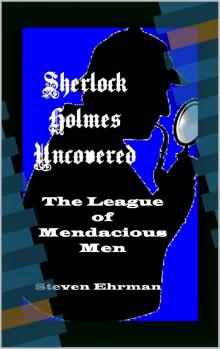 The League of Mendacious Men (A Sherlock Holmes Uncovered Tale Book 10)
The League of Mendacious Men (A Sherlock Holmes Uncovered Tale Book 10)